
As an SEO agency grows, the charming chaos of spreadsheets and email threads quickly becomes a bottleneck. To scale effectively, you need a centralized system. This is where dedicated SEO client management software, a type of platform designed to streamline everything from task management to client reporting, becomes essential. These tools, such as AgencyAnalytics and Semrush, provide a single source of truth for campaigns. This guide reviews the top 10 options to help you find the best fit for your agency.
What is SEO Client Management Software?
SEO client management software is a specialized platform designed to help agencies organize, monitor, and report on their client campaigns in one place. It replaces scattered documents and disconnected tools by centralizing key workflows like project management, task tracking, keyword monitoring, and client communication. Think of it as the central nervous system for your agency, connecting your team’s efforts directly to client outcomes and communication, ultimately leading to better efficiency and customer satisfaction.
How It Fits the Agency Workflow End to End
A proper SEO client management system integrates into every stage of your agency’s process. It starts with onboarding, creating personalized workflows for new clients. From there, it moves into daily project management, where your team can track tasks, manage deadlines, and collaborate on deliverables. For the core SEO work, it provides tools for rank tracking, site audits, and competitor analysis. Finally, it streamlines the most time consuming part of the job, client reporting, by automating data collection and generating professional, easy to understand reports.
Key Features to Look For
When evaluating SEO client management software, prioritize platforms that offer a comprehensive feature set. Look for tools that combine several key functions to avoid needing multiple subscriptions and ensure they let you analyze performance by keyword intent.
Core Functionality to Seek:
- Project and Task Management: The ability to assign tasks, set deadlines, and track progress is fundamental. A good system helps you see who is working on what and when it’s due.
- Automated Reporting: This is a huge time saver. The software should connect to Google Analytics, Search Console, and other data sources to generate customizable, white label reports you can schedule and send automatically.
- Rank Tracking: Real time updates on keyword performance are essential for showing progress. The tool should track keywords across different search engines and locations.
- Client Communication and Portal: A centralized place for communication, like a client portal with messaging and file sharing, keeps conversations organized and accessible. Many clients expect a self service portal to check progress on their own time.
- Integration Capabilities: The software must integrate with the tools you already use, such as Google Analytics, Google Search Console, and social media platforms.
Benefits for Agencies and Clients
Adopting a dedicated SEO client management software offers significant advantages for both your agency and the businesses you serve. The market for client portal software is growing, expected to reach over $3 billion by 2030, showing how valuable these tools are becoming.
For Agencies:
- Increased Efficiency: Automating tasks like reporting and data entry frees up your team to focus on high value strategic work. One study showed businesses using customer portals saw a 63% reduction in customer service workload.
- Improved Organization: Centralizing all client information and campaign data in one place reduces errors and ensures everyone on the team is on the same page.
- Enhanced Scalability: Standardized processes and workflows make it easier to onboard new clients and team members, allowing your agency to grow without chaos.
For Clients:
- Greater Transparency: Client portals and automated reports give clients 24/7 access to their campaign performance, building trust and fostering a stronger partnership.
- Better Communication: A centralized communication hub means clients know exactly where to go to ask questions or find documents, leading to faster responses.
- Clearer ROI: Professional reports that focus on key metrics help clients understand the direct value and return on their SEO investment. Research shows a 5% increase in customer retention can boost profits by up to 95%, and clear communication is key to that retention.
While traditional agencies juggle these complexities, some businesses opt for a more streamlined approach. An AI powered service like Rankai can offer a compelling alternative by delivering high volume content and transparent reporting without the overhead of complex management software.
Selection Criteria and Our Evaluation Methodology
Choosing the right SEO client management software requires careful consideration of your agency’s specific needs. Your evaluation should be based on a few key pillars:
- Core SEO Features: Does the platform have robust tools for rank tracking, site audits, and backlink analysis?
- Project Management Capabilities: How well does it handle task assignments, deadlines, and team collaboration?
- Reporting and Customization: Can you create white-label reports that are tailored to each client’s goals and branding? If white-label delivery is critical, see our guide to white-label SEO software and a powerful alternative.
- Ease of Use: Is the interface intuitive for both your team and your clients?
- Pricing and Scalability: Does the pricing model fit your budget, and can the software grow with your agency?
Trends Shaping SEO Client Management
The world of SEO is constantly evolving, and the tools that support it are changing too. One major trend is the integration of AI to provide deeper insights and automate more complex tasks. If you’re new to this, start with our beginner’s guide to AI SEO. Additionally, with the rise of Google’s AI Overviews and generative search, agencies are facing pressure to report on visibility beyond traditional organic rankings. A recent report indicated that marketing agencies lose about 38% of their clients annually, not due to poor work, but for offering outdated solutions to modern problems like AI search visibility. The best SEO client management software is adapting to include analytics for these new search surfaces and key SERP features.
Pricing and Plan Tiers, What to Expect
Pricing for SEO client management software varies widely. Most platforms operate on a subscription model, with tiers based on the number of client projects, keywords tracked, and users.
- Entry Level Plans: These are often priced from $50 to $150 per month and are suitable for freelancers or small agencies with a handful of clients.
- Mid Tier Plans: Ranging from $150 to $500 per month, these plans typically offer more projects, advanced features like white label reporting, and API access.
- Enterprise Plans: For large agencies, custom plans can exceed $500 per month, offering unlimited projects, dedicated support, and advanced integrations.
For small businesses and startups, these costs can be prohibitive. It’s one reason why flat fee, high output services like Rankai’s $499/month program are gaining popularity, as they provide a clear, predictable cost for comprehensive SEO execution.
Top 10 SEO Client Management Software
Now that you understand the essential features to look for in SEO client management software, let’s dive into the top platforms that can help streamline your agency’s operations. The following tools have been curated based on their robust reporting capabilities, intuitive dashboards, and features designed to enhance client communication and retention. Each offers a unique blend of functionalities to help you effectively track performance, demonstrate value, and build lasting client relationships.
1. AgencyAnalytics
AgencyAnalytics takes the grunt work out of client reporting so your team can focus on strategy. Built with agencies in mind, it pulls SEO, paid, social, and e-commerce metrics into clean, branded portals that clients actually use. We picked it for its agency-first design, including unlimited client logins, roll-up views, and automation like AI summaries, so you can scale communication without adding headcount. If your goal is clearer ROI storytelling and fewer spreadsheets, this platform makes the hand-off from data to decisions effortless.
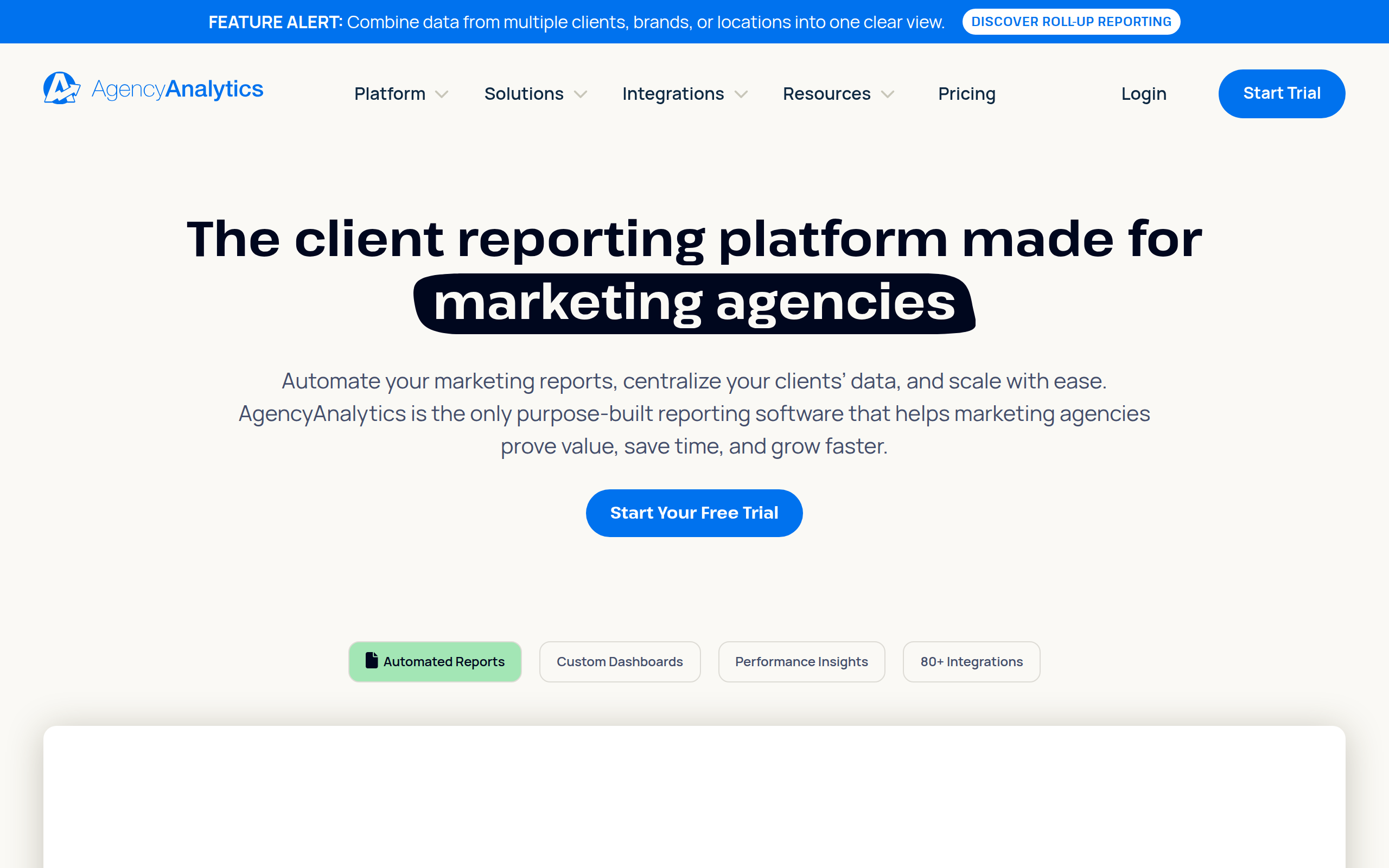
At-a-glance
- Best for: Agencies needing automated, white-label client reporting
- Starting price: $59/month
- Free trial: 14 days
Why it works for client management
- White-label portals and reports with custom branding and domains
- Multi-client dashboards and unlimited client user roles
- 80+ integrations including GA4, Google Ads, Shopify, and HubSpot
- Automation for scheduled reports, metric alerts, and AI summaries
- Built-in task management and collaboration features
- Data exports to Google Sheets and API access on higher tiers
Pros
- Quick setup with 80+ integrations
- Automation meaningfully reduces reporting workload
- ROI-centric dashboards clients understand
Cons
- Per-client pricing can add up at scale
- Some key features are paid add-ons
- No native site audit tool
2. Raven Tools
Raven Tools makes month-end reporting feel like a quick pass instead of a full-day project. It unifies GA4, GSC, ads, and social into polished dashboards that agencies can brand and schedule. This is ideal when you manage a portfolio of clients and need repeatable, credible updates. We chose it for its balance of speed and simplicity: unlimited automated reports, clean layouts, and minimal setup friction. If you want to standardize client communication without a BI buildout, Raven delivers the essentials.
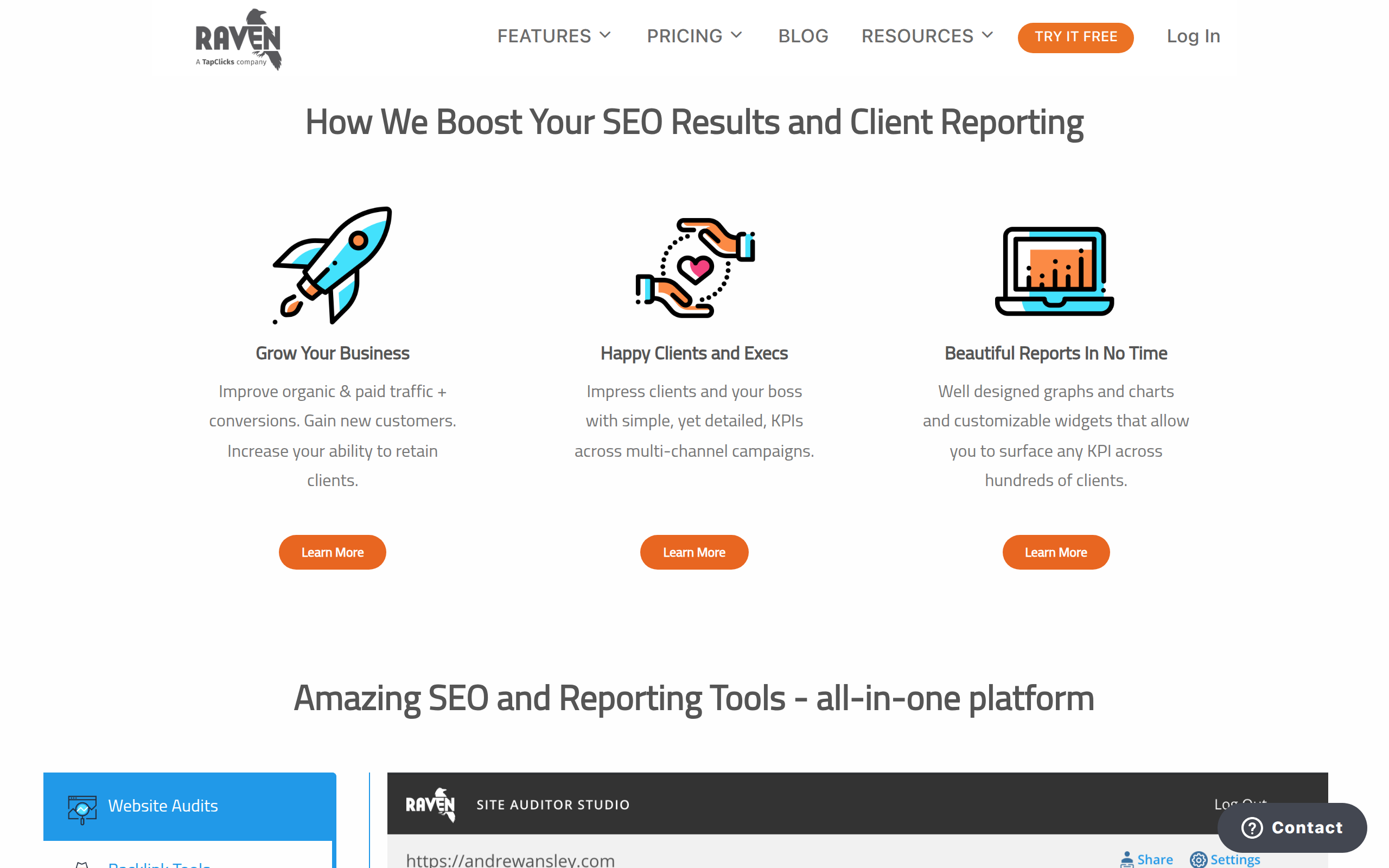
At-a-glance
- Best for: Agencies needing fast, white-label SEO/PPC reporting
- Starting price: $49/month
- Free trial: 7 days
Why it works for client management
- White-label client portals, reports, and emails with custom domains
- Unlimited scheduled reporting via PDF, HTML, or shareable links
- Multi-client dashboards with granular roles and permissions
- Native integrations for GA4, GSC, Google Ads, Microsoft Ads, and social
- Built-in task management to track deliverables
- Data exports to CSV and optional Looker Studio connectors
Pros
- Budget-friendly with generous user/report limits
- Automated reporting and self-serve portals save hours
- Professional white-labeling with minimal setup
Cons
- No deep BI data modeling
- Limited enhanced e-commerce reporting
- Rank-tracking costs can rise with scale
3. Swydo
Swydo turns KPI management into a disciplined, scalable routine. It centralizes SEO, PPC, and analytics data in branded reports and live dashboards that stakeholders can scan at a glance. We picked it because it’s purpose-built for agencies: unlimited users, white-label domains, client portals, and KPI alerts make standardization easy across dozens of accounts. The result is fewer custom builds, more consistency, and sharper, ROI-focused conversations.
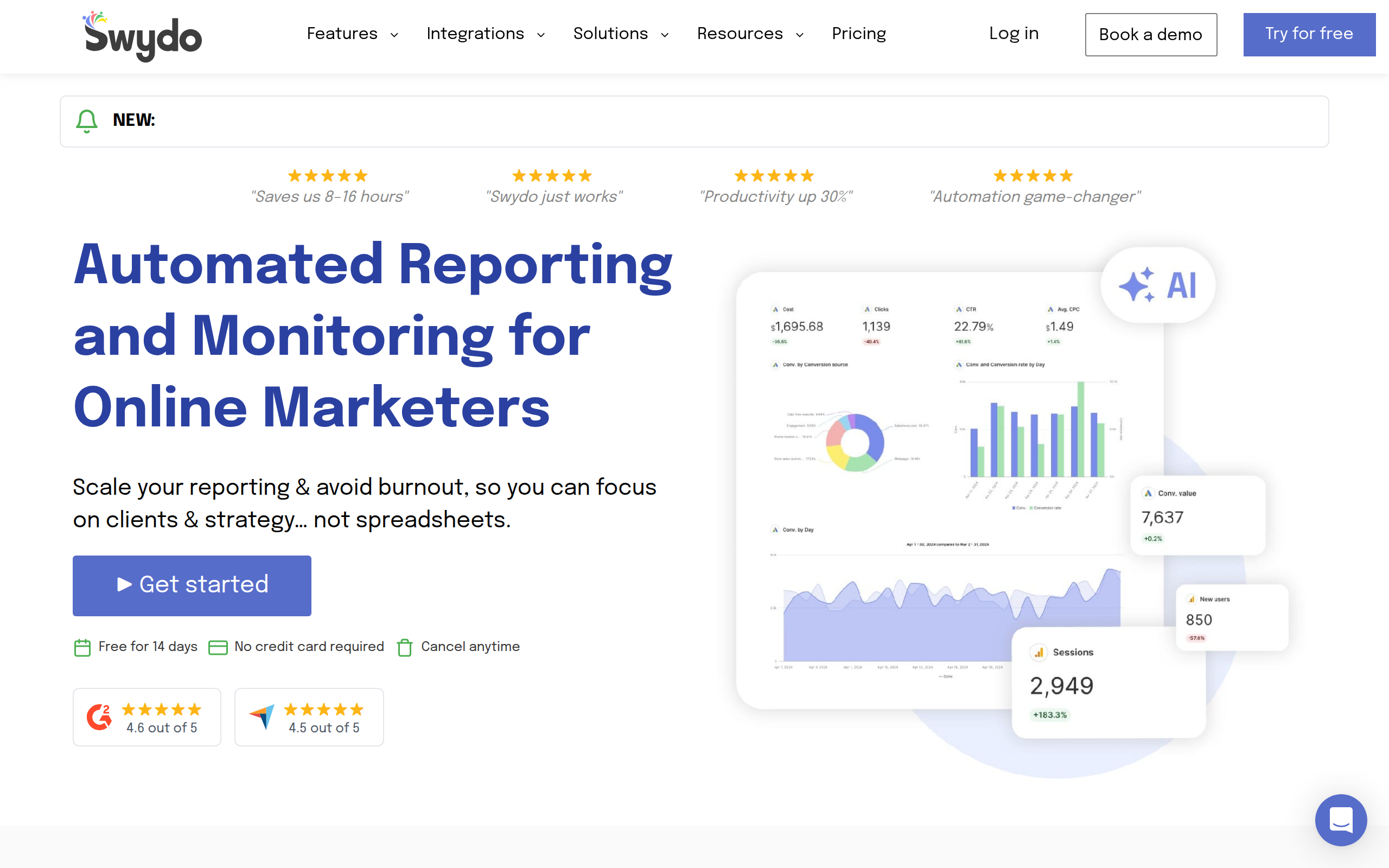
At-a-glance
- Best for: Scalable, white-labeled SEO/PPC client reporting
- Starting price: $69/month
- Free trial: 14 days
Why it works for client management
- White-label reports and dashboards on your own domain
- Multi-client KPI monitoring with roles and permissions
- Connectors for GA4, Google Ads, Meta Ads, Shopify, and Semrush
- Automated scheduling by timezone and KPI target alerts
- Merge multiple ad platforms into a single widget
- Exports to branded PDF, CSV, and live links
Pros
- Unlimited users and white-labeling at agency-friendly pricing
- Templates and automation drastically cut reporting time
- Client portal centralizes visibility and feedback
Cons
- Pricing scales with number of data sources
- No native rank tracking
- Less customizable than full BI
4. SE Ranking
SE Ranking blends an all-in-one SEO toolkit with agency-grade client access. Rank tracking, audits, research, and GA4/GSC integrations flow into branded dashboards and reports, plus a full white-label portal if you want clients logging in under your domain. We chose it for giving SMBs and agencies enterprise-style reporting and automation without the enterprise bill. It’s a reliable backbone for client visibility and status updates in one place.

At-a-glance
- Best for: All-in-one SEO client management
- Starting price: $52/month (billed annually)
- Free trial: 14 days
Why it works for client management
- White-label client portals on your domain with scheduled, branded emails
- Multi-client dashboards with granular roles and guest access
- GA4, GSC, and Matomo integrations; native Looker Studio connectors
- Automated alerts for page changes and backlink status
- Built-in SEO task manager for assigning deliverables
- API and connectors for Looker Studio, Sheets, and BI tools
Pros
- Affordable, agency-grade white-label portals
- Scalable reporting via GA4/GSC and API access
Cons
- Full white-labeling requires the Agency Pack add-on
- Costs scale with keywords and add-ons
5. Semrush
Semrush is the heavyweight that lets agencies run SEO, paid, local, and content programs from a single command center. It consolidates cross-channel data into scheduled, white-label reports and live dashboards clients can view without handholding. We picked it for its depth, including role-based access, GA4/GSC and ads integrations, and AI-driven summaries and alerts, so teams can stay proactive and keep reviews focused on outcomes, not just activities.
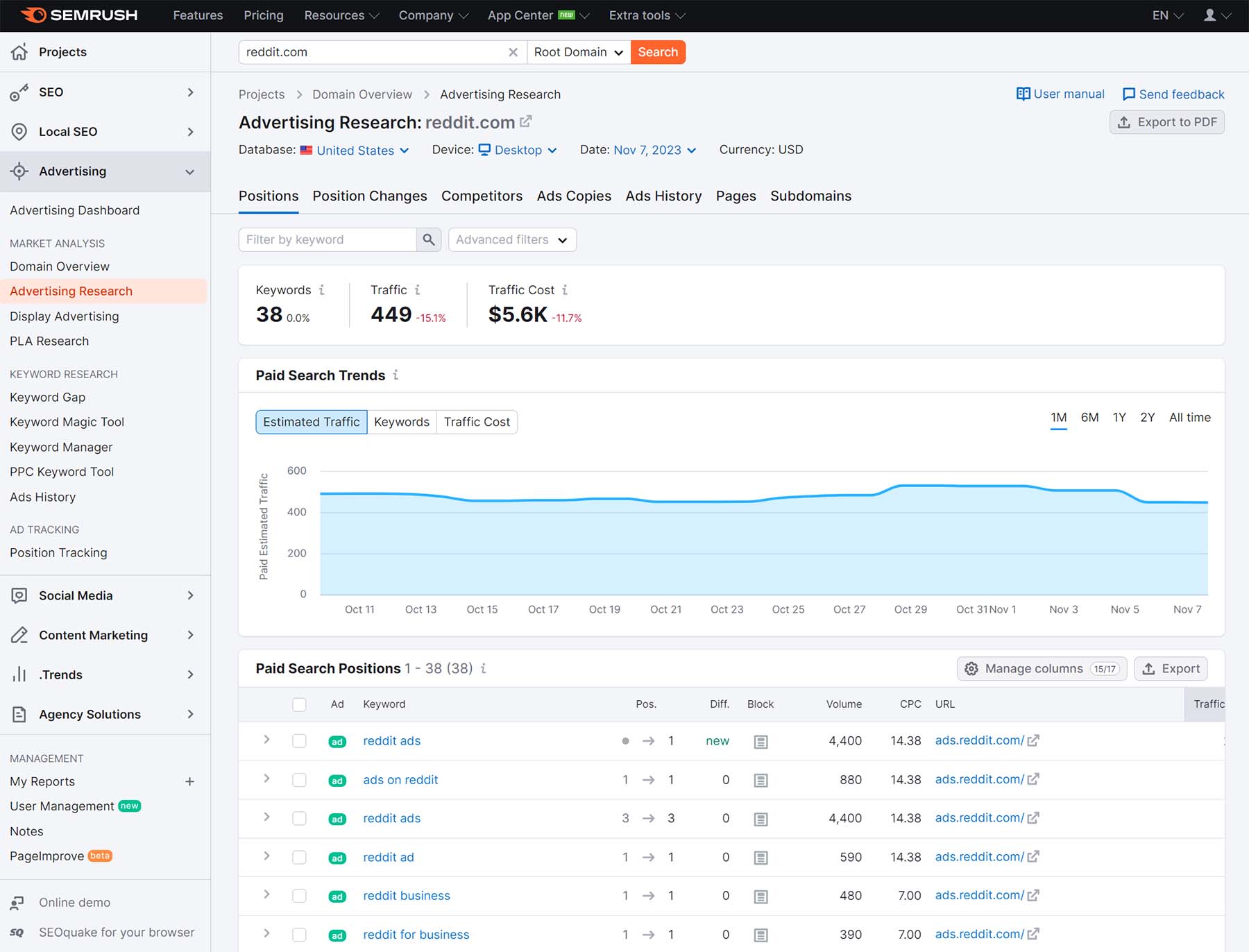
At-a-glance
- Best for: All-in-one SEO platform with multi-client reporting
- Starting price: $139.95/month
- Free trial: 7 days
Why it works for client management
- White-label reports and live dashboards with scheduling and AI summaries
- Multi-client access with granular roles and project permissions
- Integrations for GA4, GSC, ad networks, social, and e-commerce
- Automated site audits and AI Copilot alerts
- Tasking and collaboration via a shared Marketing Calendar
- Exports to Looker Studio and API access
Pros
- Unifies cross-channel data for time-saving reporting
- Scales with agency-friendly seats and automation
Cons
- Add-ons (like extra seats) increase cost
- Advanced connectors require higher tiers
6. WebCEO
WebCEO is built for agencies that want a true white-label portal and automated report delivery with their own domain front and center. It supports unlimited client projects, ties in GA4, GSC, and Google Ads, and sends clean, branded updates on schedule. We chose it because it marries cost-effective scaling with multi-client workflows, making it a dependable option for agencies that need to present under their brand while keeping ops lean.
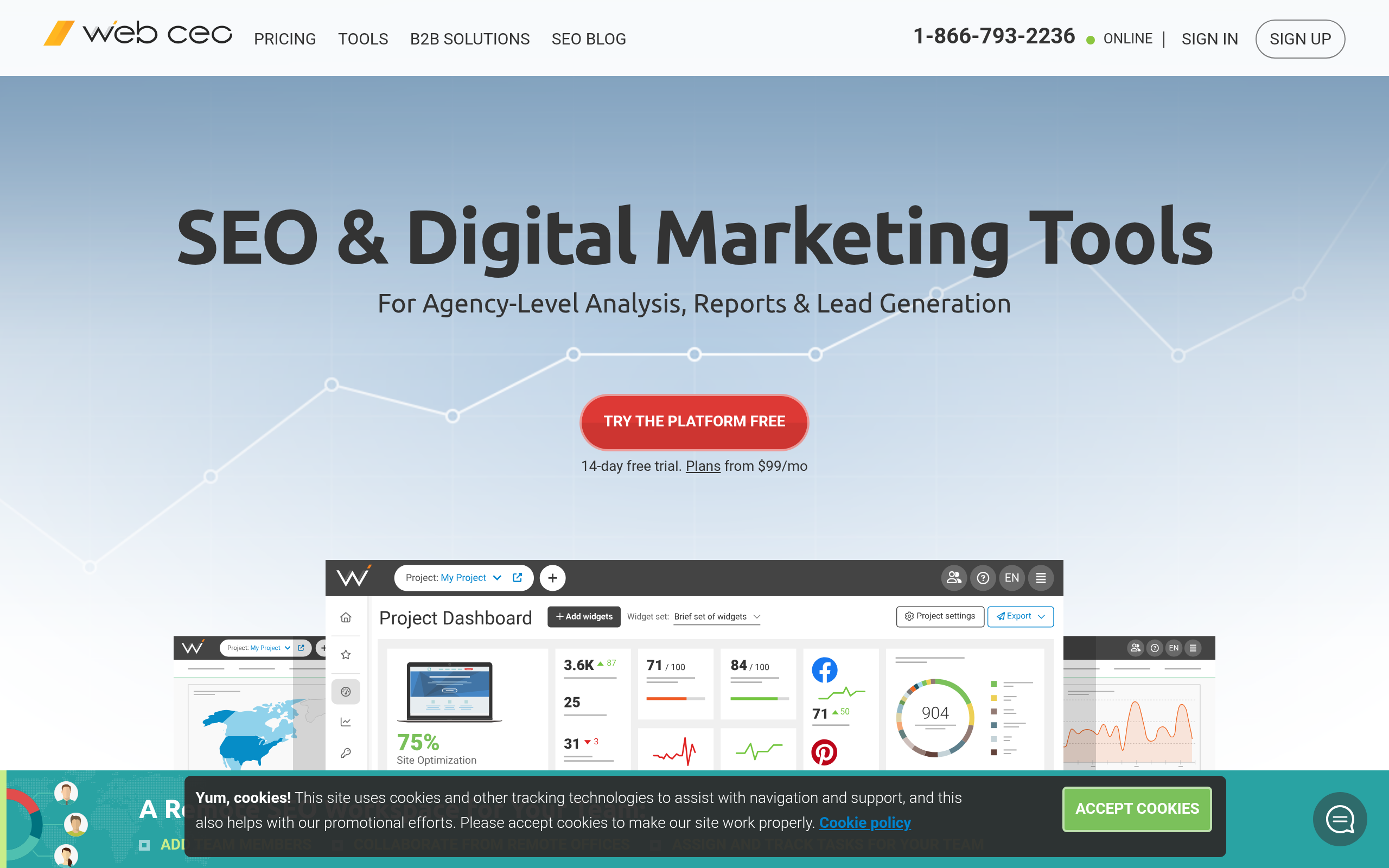
At-a-glance
- Best for: Agencies wanting a white-label SEO client portal with automated reporting
- Starting price: $99/month
- Free trial: 14 days
Why it works for client management
- White-label client portal on your domain with live, web-based reports
- Unlimited projects and keywords on Agency Unlimited
- Integrations with GA4, GSC, Google Ads, and Google Business Profile
- Automated rank scanning, scheduled delivery, and instant alerts
- Lead generation widget to capture SEO leads on your site
- Looker Studio connector and API for custom dashboards
Pros
- True white-label delivery with custom domain and API
- Economical scaling with usage-based pricing
- Automated, ROI-focused reporting
Cons
- Usage-based pricing can be confusing
- Looker Studio connector limited mainly to rank data
7. BrightLocal
BrightLocal specializes in local SEO at scale, from rankings and listings to reviews and posts. Agencies and multi-location brands get white-label dashboards, smooth onboarding, and roll-up reporting that turns hundreds of locations into a clear performance story. We picked it for its client-friendly workflows and time-savers like AI GBP posts and listing change alerts, which are perfect for teams juggling many local profiles.
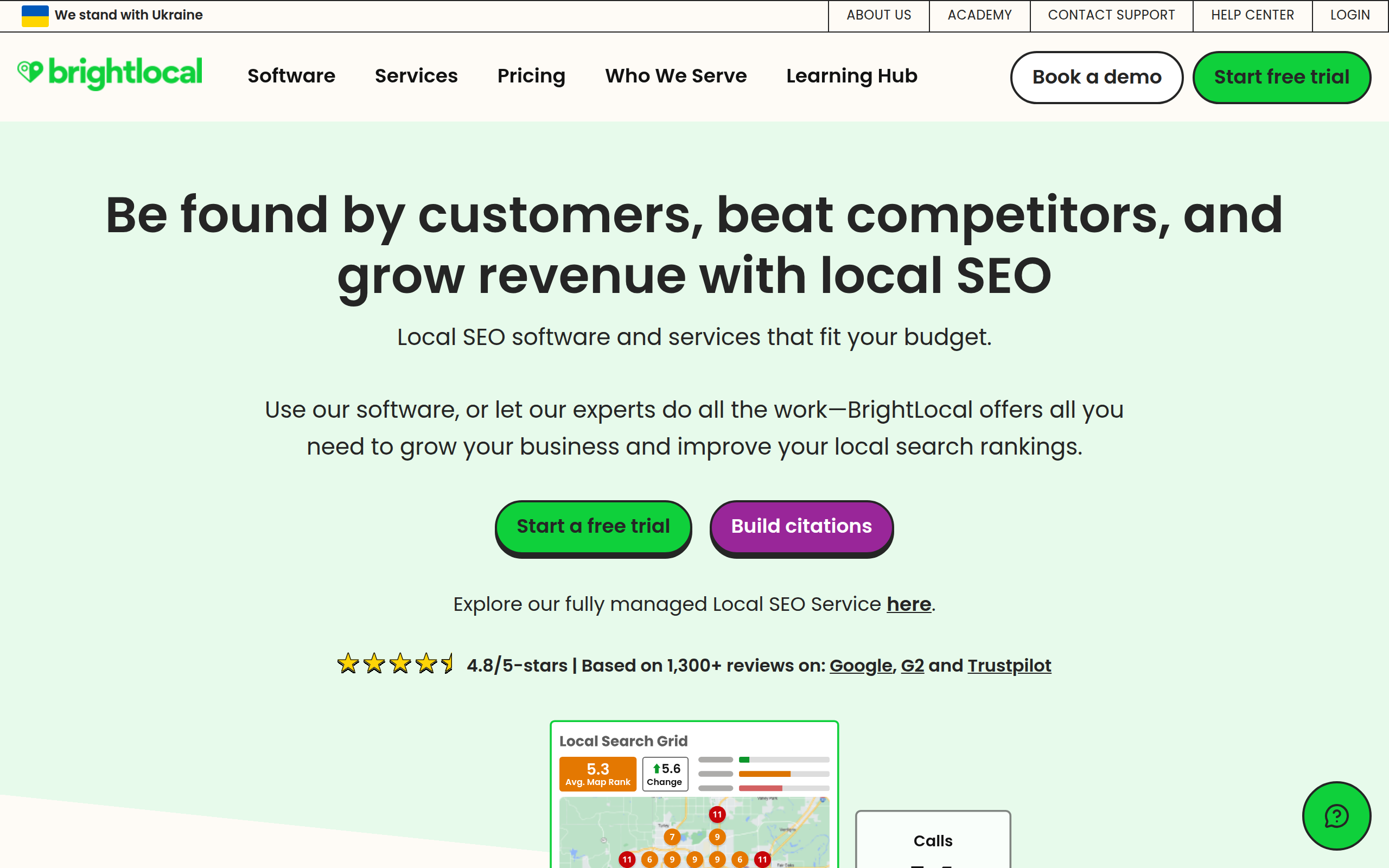
At-a-glance
- Best for: Agencies and multi-location brands managing local SEO
- Starting price: $39/month
- Free trial: 14 days
Why it works for client management
- Fully white-label portals, reports, and dashboards with custom domains
- Multi-location roll-up reporting across clients
- Integrations with Google Business Profile, GA4, and Facebook
- AI-powered GBP post generation and scheduling
- Listing change alerts and centralized approvals via Active Sync
- Exports (PDF, CSV, XLSX) and API access
Pros
- Fast onboarding with easy white-label profiles
- Scales for franchises and multi-location brands
- Unlimited seats with flexible permissions
Cons
- Pricing scales per location; some features are add-ons
- Limited direct integrations beyond Google and Facebook
8. Advanced Web Ranking
Advanced Web Ranking (AWR) brings agency-grade accuracy and automation to rank tracking at scale. With unlimited client projects, global coverage, and integrations that tie rankings to traffic and outcomes, it transforms a complex dataset into client-friendly insights. We picked it for its shareable live reports, performance alerts, and Looker Studio/BigQuery options. These features give you everything you need to prove progress without manual wrangling.
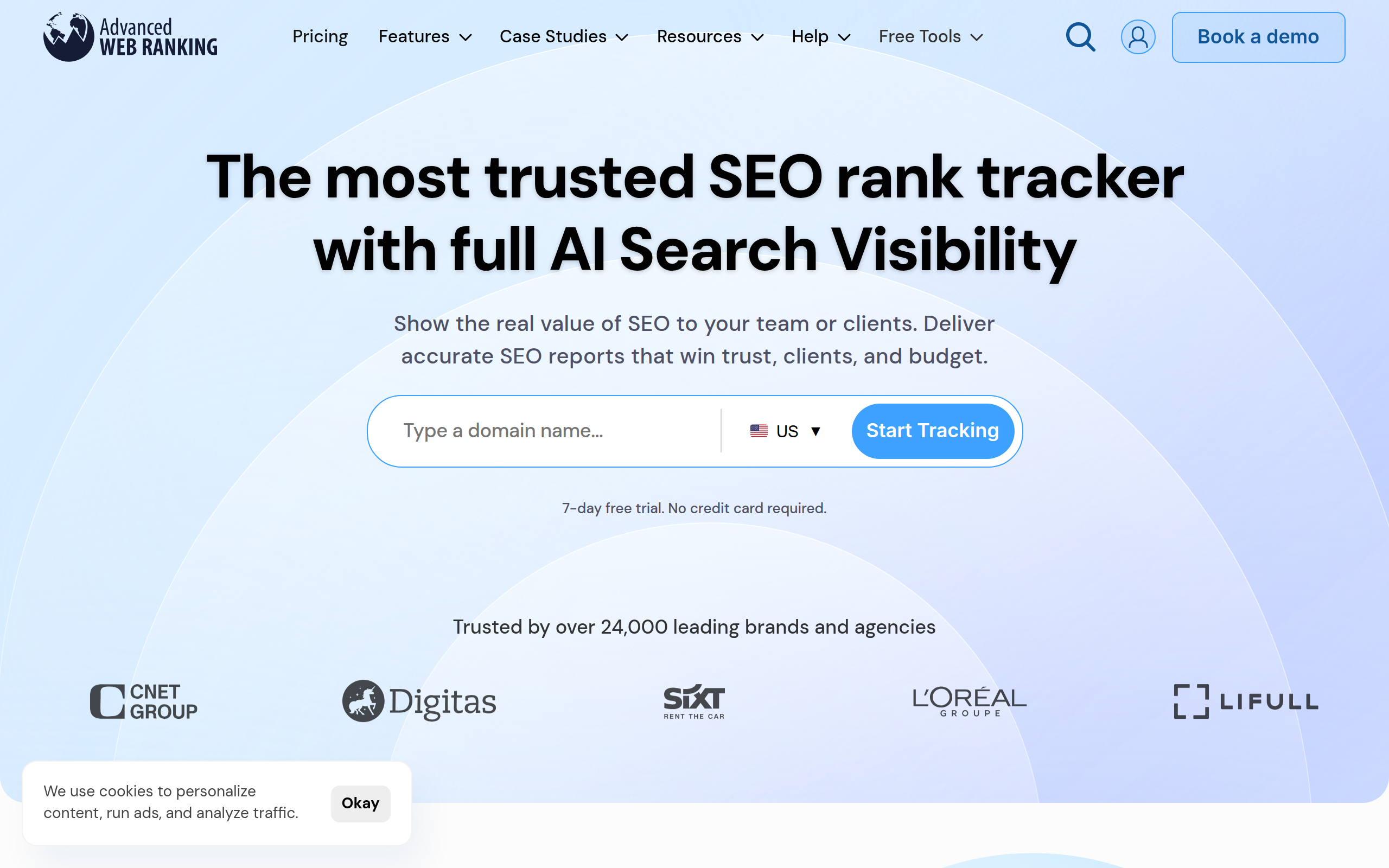
At-a-glance
- Best for: Agencies needing scalable, accurate rank tracking with white-label reporting
- Starting price: $139/month
- Free trial: 7 days
Why it works for client management
- Fully white-label portals and reports on your domain
- Granular roles and permissions for safe client access
- GA4 and GSC integrations connect rankings to real impact
- Automated scheduling and alerts to email or Slack
- Looker Studio connector and BigQuery exports for custom dashboards
Pros
- Built to scale agency workflows
- Client-friendly, ROI-focused reporting
- Reduces manual reporting overhead
Cons
- Pricing rises with advanced needs
- Not an all-in-one SEO suite
- Setup has a learning curve
9. DashThis
DashThis streamlines marketing and SEO reporting into clean, automated dashboards clients love. With 30+ native connectors, daily refreshes, and scheduled email sends, it removes spreadsheet busywork and standardizes delivery across accounts. We picked it for its agency-friendly features like unlimited users, white-labeling, and a deep template library, so you can launch professional, branded reporting in minutes.

At-a-glance
- Best for: Automated, white-label reporting for agencies
- Starting price: $49/month
- Free trial: 15 days
Why it works for client management
- White-label reports and portals with custom domains and branding
- Unlimited users and password-protected sharing links
- Integrations for GA4, GSC, Google Ads, Ahrefs, and Semrush
- Daily data refreshes and scheduled email distribution (with PDFs)
- AI insights for auto-generated summaries, wins, and opportunities
- Google Sheets and CSV imports for non-native data
Pros
- Rapid setup with 50+ templates
- Unlimited users on all plans
- Strong white-label options for branding
Cons
- Lacks granular role-based permissions
- Some e-commerce connectors are missing
- Limited export options
10. SEO PowerSuite
SEO PowerSuite offers an all-you-can-track model that’s ideal for budget-minded agencies. The desktop suite spans rank tracking, audits, backlinks, and outreach, organizing each client as its own project with automated, white-label reporting. We picked it because unlimited keywords and projects at a flat annual fee are rare, and the built-in scheduler makes recurring updates dependable, even for large portfolios.
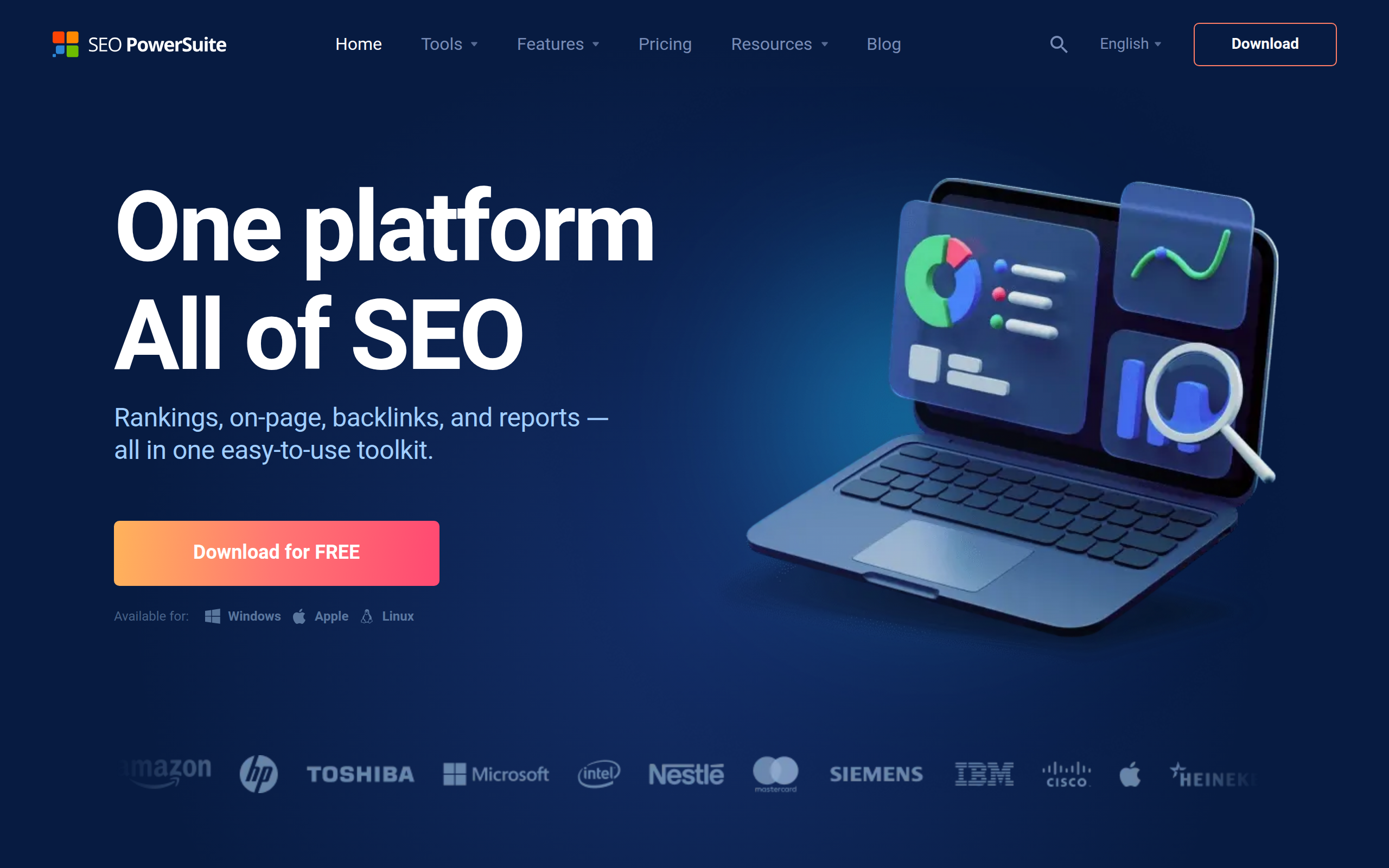
At-a-glance
- Best for: Agencies needing unlimited desktop rank tracking
- Starting price: $349/year
- Free plan/trial: Yes
Why it works for client management
- White-label reporting with templates, shareable links, and scheduled emails
- Multi-client project organization with cloud storage for sharing
- Direct GA4 and GSC integrations for traffic and query data
- Automated rank alerts and report publishing via Scheduler
- Native Google Ads Keyword Planner data for ROI-minded research
- Tracks visibility within Google’s AI Overviews
Pros
- Flat, cost-effective pricing with unlimited projects/keywords
- Robust automated reporting saves time
- Cross-platform (Windows, macOS, Linux)
Cons
- Desktop-dependent; automation requires the app running
- No cloud-native client portal; single-user license limits concurrency
- Advanced exports gated to Enterprise
Decision Guide: Pick Based on Your Use Case
Not all agencies need the same solution. Your choice of SEO client management software should align with your primary business model.
- For a Full Service Agency: Look for an all-in-one platform like AgencyAnalytics or Semrush that combines deep SEO analytics with robust project management and reporting.
- For a Reporting Focused Agency: If your main goal is to deliver beautiful, automated reports, a tool like AgencyAnalytics is a strong contender due to its 70+ integrations and focus on white label dashboards.
- For a Small or New Agency: A more affordable and user friendly option like Sitechecker could be a great starting point, offering a good balance of features without a hefty price tag.
- For an Alternative to Agency Tools: If you’re a business owner who wants results without managing an agency or its software, a done for you service is a better fit. A solution like Rankai delivers 20+ pages of content monthly with transparent reporting, bypassing the need for you to manage the process at all.
Building Your Agency Stack (When One Tool Isn’t Enough)
Even the best SEO client management software might not do everything. Most agencies build a “stack” of complementary tools. Your client management platform serves as the central hub, but you might integrate it with more specialized tools. For instance, you could use Ahrefs for its powerful backlink database and competitor research, and then pull that data into your management software for reporting. Then translate insights into a keyword cluster plan to organize topics and internal links. The key is to ensure your central platform can integrate seamlessly with these other tools to create a single source of truth.
Implementation and Change Management
Switching to a new software platform requires a plan. Start by getting buy in from your team and clearly communicating the benefits. Designate a “champion” to lead the transition and training. Begin by migrating one or two clients to the new system as a pilot project before moving everyone over and running a quick technical SEO audit to benchmark issues first. Finally, create standardized operating procedures to ensure everyone on the team uses the software consistently, which is crucial for maintaining data accuracy and efficiency.
Measuring Success: KPIs and ROI
The ultimate goal of using an SEO client management software is to improve your agency’s performance and profitability. Key Performance Indicators (KPIs) to track include (and if you’re unsure which matter most, see how to tell if your SEO strategy is working):
- Time Saved on Reporting: Measure the reduction in hours your team spends creating client reports each month.
- Client Retention Rate: A streamlined process and better communication should lead to happier clients and lower churn.
- Team Productivity: Track the number of tasks completed and projects delivered on time.
- Profitability Per Client: With increased efficiency, your profit margins per client should improve.
Conclusion: How to Move From Evaluation to Action
Choosing the right SEO client management software is a critical step in scaling your agency. It replaces administrative headaches with streamlined workflows, allowing you to focus on what truly matters: delivering exceptional results for your clients. By centralizing tasks, automating reporting, and improving communication, you build a foundation for sustainable growth and long term client relationships.
Ready to see how an efficient, AI powered approach can transform your SEO without the complexity of traditional agency management? Explore how Rankai delivers scalable results with a simple, flat monthly fee.
Frequently Asked Questions
What is the main purpose of SEO client management software?
The primary purpose is to centralize and streamline all the tasks related to managing SEO clients. This includes project management, keyword rank tracking, automated reporting, and client communication, all within a single platform to improve agency efficiency.
Can small agencies benefit from this type of software?
Absolutely. Many platforms offer affordable entry level plans designed for small agencies or even freelance SEOs. An effective SEO client management software helps small teams look professional, stay organized, and compete with larger agencies.
How does SEO client management software improve client retention?
It improves retention by increasing transparency and communication. Automated reports keep clients informed of progress, while client portals provide a direct line for questions and collaboration. This proactive approach builds trust and demonstrates the value of your work, which is critical for retaining clients.
Do I still need tools like Ahrefs or Semrush if I have management software?
Often, yes. While some all in one platforms have strong built in tools, many agencies use specialized software like Ahrefs for in depth backlink analysis or competitor research and integrate that data into their central management platform for reporting.
What’s the difference between SEO client management software and a general CRM?
While a general CRM manages customer relationships across a business, SEO client management software is built specifically for the SEO agency workflow. It includes specialized features like rank tracking, site auditing, and integrations with tools like Google Search Console that a standard CRM would not have.
Is it difficult to switch to a new client management platform?
It can be a challenge, but with proper planning, the transition can be smooth. It’s best to start with a pilot project, train your team thoroughly, and establish clear procedures for using the new system. The long term efficiency gains usually far outweigh the short term hassle of implementation.
Are there alternatives to using SEO client management software?
For businesses that want SEO results without the overhead of managing an agency relationship, services that productize the workflow are a great alternative. For instance, a provider like Rankai offers a complete “done for you” program with a flat monthly fee, delivering high volume content and technical fixes without requiring the client to interact with complex management software.
How much should I expect to pay for SEO client management software?
Costs can range from around $50 per month for basic plans suitable for freelancers to over $500 per month for enterprise level solutions designed for large agencies with dozens of clients. Your cost will depend on the number of projects, users, and features you need.